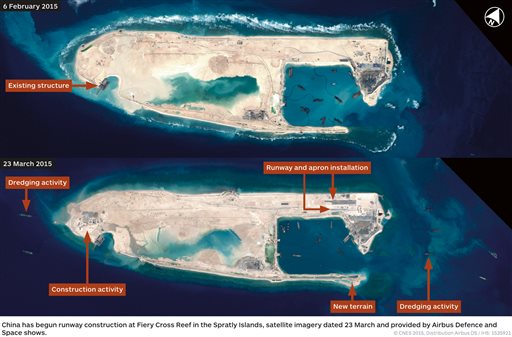
This combination photo of satellite images taken on Feb. 6, 2015, top, and March 23, 2015, bottom, by Airbus Defence and Space, and distributed by IHS Jane’s Defence Weekly, shows what IHS Jane’s describes as an airstrip on Fiery Cross Reef in a disputed section of the South China Sea. AP
KUALA LUMPUR—Philippine Foreign Secretary Albert del Rosario on Sunday urged the Asean to stop China’s “destabilizing activities” in the South China Sea, warning that Beijing was poised to take “de facto control” of the area.
At the foreign ministers’ meeting of the Association of Southeast Asian Nations (Asean), Del Rosario said: “Is it not time for Asean to say to our northern neighbor that what it is doing is wrong and that the massive reclamation must be immediately stopped? On this most important issue, is it not time for Asean to finally stand up for what is right?”
He stressed that the global community—from US senators to the Asean secretary general, and G7 foreign ministers—had come up with a statement on the “issue unfolding in our region.”
China’s reclamation activities are so massive that “if it is allowed to be completed, our northern neighbor will succeed in defining and imposing its unlawful sovereignty claim over more than 85 percent of the South China Sea,” Del Rosario said,
“Asean should assert its leadership, centrality and solidarity. Asean must show the world that it has the resolve to act in the common interest,” he said.
It was the strongest statement yet issued by the Philippines in the Asean, which has always deemed the maritime dispute as a heavy burden. Most of its members are dependent on China for trade.
President Aquino, who arrived in Kuala Lumpur at 4 p.m. on Sunday, is expected to bring up at the leaders’ plenary during the 26th Asean Summit on Monday, China’s land grabbing in the seas and make the same appeal for a collective stand.
Del Rosario did not mention “China” in his statement, instead using “northern neighbor” to refer to it.
The Philippines “has borne more than its share of the heavy burden for Asean and the international community on this issue,” he said.
Failure to act on China’s moves would “undermine Asean’s very centrality, solidarity and credibility,” Del Rosario said.
He also said that even the declaration of the Asean-China Maritime Year 2015 “disregards” the Asean centrality.
“Notwithstanding all our words of caution, our northern neighbor is clearly and quickly advancing with its massive reclamation. It is poised to consolidate de facto control of the South China Sea. Our northern neighbor has moreover said it will place defense installations on the reclaimed areas,” Del Rosario said.
Within the Asean, the Philippines, Malaysia, Brunei and Vietnam are claiming parts of the South China Sea. China, on the other hand, asserts ownership to almost the entire area with its so-called nine-dash line claim.
Del Rosario noted a “growing gap between what we were hearing in diplomatic terms and what was really happening in the South China Sea.”
“We also warned that massive reclamation was clearly intended to change the regional status quo, to advance our northern neighbor’s unreasonable, expansive and illegal so-called nine-dash line claim, to undermine the rule of law and to render the DOC (Declaration of Conduct of Parties in the South China Sea) and the COC (Code of Conduct) irrelevant,” he said.
He added that in all probability, China would agree to conclude the COC, the legally binding agreement among the claimant states, once the reclamation is completed. With all the new land features in place, a COC would “have the effect of legitimizing China’s reclamation.”
Del Rosario stressed that China’s activities “are real and cannot be ignored or denied.”
“Their adverse implications are urgent and far-reaching, going beyond the region to encompass the global community,” he said.
Del Rosario submitted to the meeting a disk containing satellite photographs of the new islands built by China on various reefs and atolls, most of which host forward military bases.